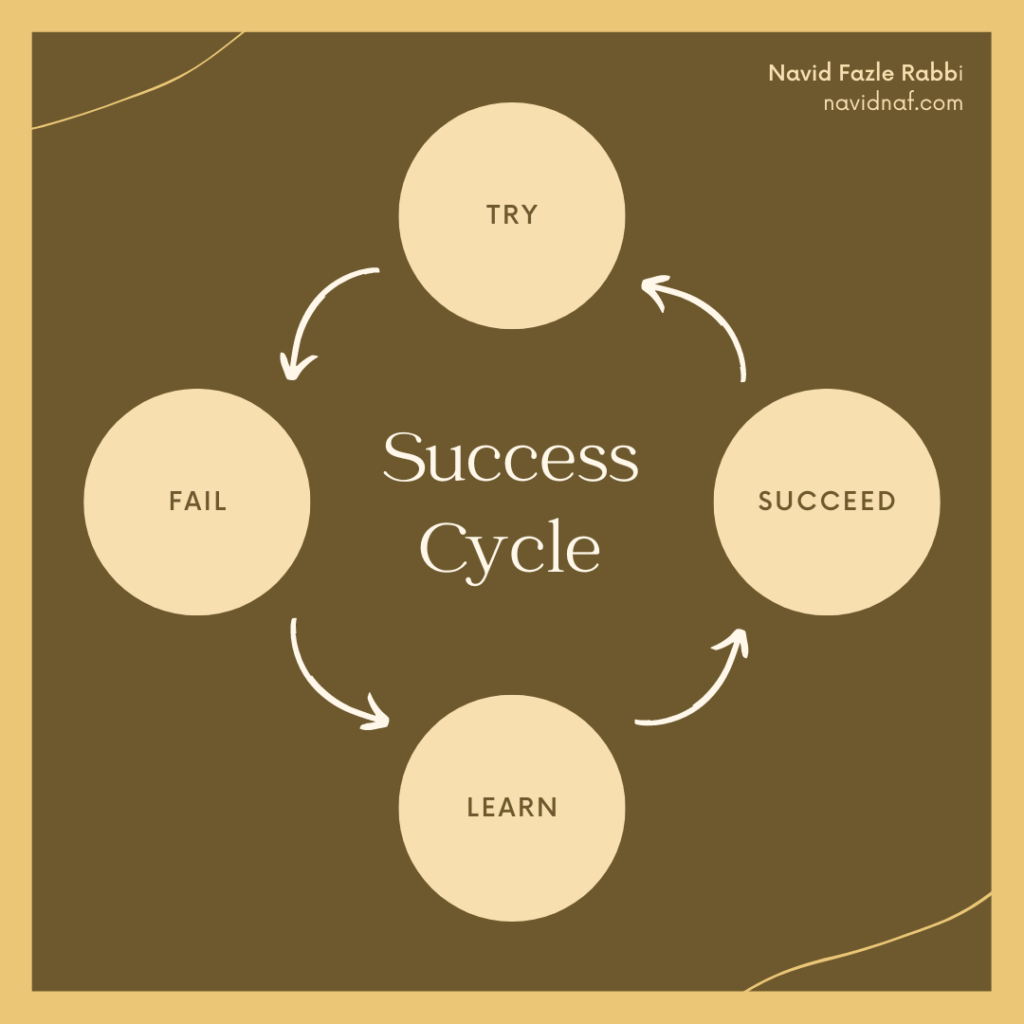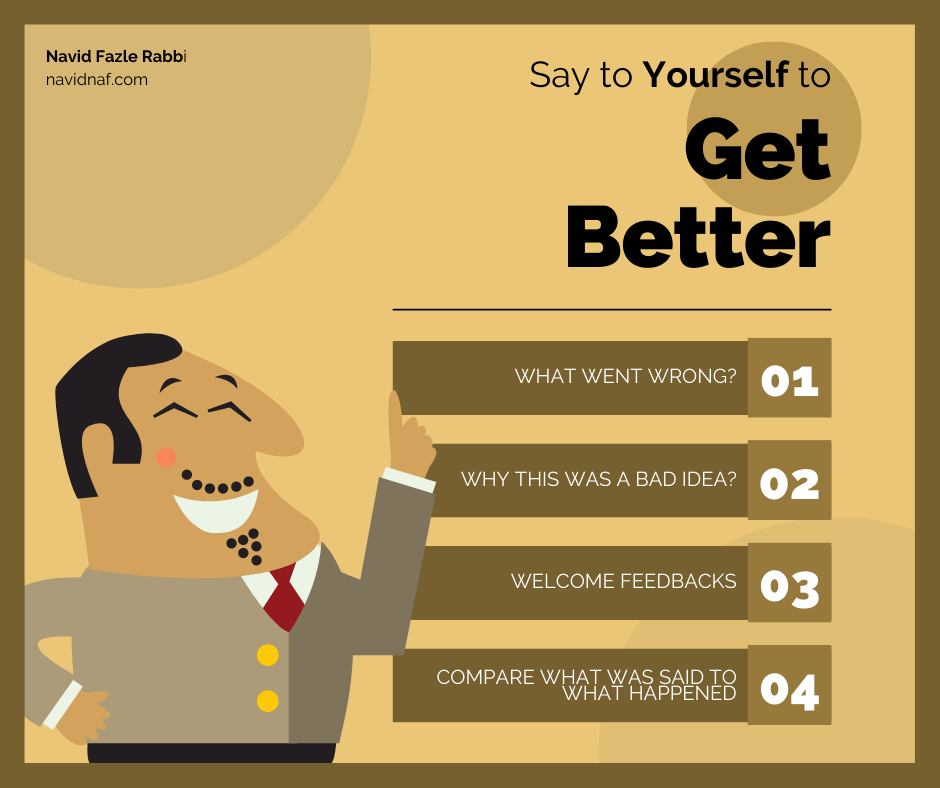You will fail. – This is true everywhere.
Failure is both normal and necessary. Personal growth often comes from the challenges we face along the way. Yet, many people view failure as a cloud of negative emotions looming over them.
But failure is an essential part of learning, paving the way for future success.
I’ve failed many times in my life, and each time I’ve learned to embrace it instead of letting it bring me down. Most people try to hide or ignore their struggles, but recognizing failure brings wisdom, humility, courage, and perspective.
So, what does it really mean to fail?
Depth
We always want things to go well. On the other hand, we don’t like to see ourselves fail. We need to change the way we think about things that don’t work out. Success is how well you do when you are learning. Keeping this in mind, failure is one way to learn and improve your chances of succeeding.
But we know very well that most people have trouble coming to this conclusion. Fear is the reason why. We don’t want to lose. People find it hard to set personal goals because they are afraid of failing. Instead, they set low professional goals. It’s important to remember that this fear has nothing to do with how confident we are in ourselves. This affects us because our fear of failure comes from the people around us. The way we are taught is where the fear of failure comes from. You want to get a good grade, but you’re afraid of getting a bad grade. This makes your fear grow, and it’s just a thought process.
Our society is based on contests. In every part of life, you can only find competition. To try to get something by going against each other.
What are the worst things to be afraid of? – Worry that you won’t do it right. Putting the mind to the test. Not being able to accept it. – Such worries may be fair, but they are in no way effective.
We need to keep in mind that failure is a normal part of life. A small piece of a long video. And we are not people who are afraid to fail. When we believe in fear more than we believe in ourselves, we start a cycle of failure. If we let our failures drown us, all we’re doing is avoiding failure, fighting it, piling up failures, and then facing a collapse.
Failure is normal and necessary.
When we start to understand this, it starts to help us.
Failure Makes us Learn
No one succeeds. If you look back at the lives of successful people, what do they all have in common? Failure. Everyone has failed at some point in their lives. And they turned their loss into a success because they were more determined to learn from it than to let it take over their lives.
The first thing you should do if you fail is not to give up. We fail not only once, but also many times. Still, we don’t like the taste of success as much as we don’t like the taste of failure. However, you always love the taste of overcoming a loss with the success you wanted.
Think of the famous example of Robert Bruce, who lost six times but won the seventh time. He was inspired by seeing a spider try to make a web six times in a row and fail but then succeed on the seventh try. This gave him the motivation to fight again, and he won.
We should embrace the success cycle – Try. Fail. Learn. Succeed.

We’ll have to try, fail, and learn a few times before we finally get a taste of success.
We have to fail to taste success. At the same time, we have to accept what it means to seek and work to find a way to do something. We need to be immune to the bad effects of failure. If we start learning from our mistakes, we will be careful in our work and smart about taking risks.
The objective of a specific task should not be successful. Rather, to learn from the experience of achieving that particular performance. We must be encouraged to face and accept challenges if we want to reach our full potential.
Long-term failure can define your claim to success. On the other hand, long-term success may mean that you’re not taking enough risks. Take little chances or not. It’s because that’s what happens when a big risk is taken.
Types of Failures
Personal Errors
It means mistakes that happen because of a lack of skill, attention, or team/work fitness.
External or Contextual Factors
Things that we can’t change. Things can go in any direction, and if you are confused, you will make mistakes. It depends on what’s going on. If something goes wrong, tasks might not get done. Mitigation: Make a plan and then carry out a backup plan for important tasks. Plan for whatever might happen. Getting the knowledge you need to adapt to a changing world and new methods.
Striving Effects
In the name of development, progress, and creativity, there have been failures. Pioneering, or trying something new that hasn’t been done before, could fail because of a sudden change in the situation. Then you should do the same. Getting things done when you only have a small space.
Now, the question is whether to play it safe or take a chance. One must be interested in the truth behind the issues. No matter what, it has to be done. How likely is that to happen? What does the process lead to?
Owing the Mistakes
Everybody makes mistakes, but not everyone gets why they need to take responsibility for them. Because admitting your mistakes is always the first step to learning from a setback. It means realizing that you are to blame for any or all of the bad things that just happened.
Why people don’t own up to their errors? –
- Easy to blame someone else. BLAME stands for “barely legitimate, almost meaningless excuse.” Blame games are never helpful. We tend to put the blame for our mistakes on other people so that we can stay safe and not learn from our mistakes.
- No one says anything. People know they are partially or completely to blame for something, but they don’t say anything about it.
- We are trying to avoid having to defend ourselves. We’d rather cover up for the mistakes we’ve made. We’re starting to give silly reasons why we haven’t failed, which don’t make sense.
It’s a good thing to own up to a mistake. We’re not always right. We have to accept that we are not perfect. We have to accept this fact if we want to push ourselves, be successful, and be inspired to work harder. So, how should we take responsibility for a failure?
- We need to know what we bring to the table.
- We need to be honest about the mistakes we’ve made.
- If someone asks, we have to give an explanation.
- We need to explain what we’ve learned and what we want to do with our work.
- Do all the tasks and work hard to reach your goal.
Benefits of owning a mistake –
- Learning quickly and very well.
- Shows that we are honest and willing to take care of things.
- Making things happen and giving people thoughts they can relate to.
We have to remember: Mistakes are catalysts to learning.
Causes of Failure
We need to think about what it means to have a learning mindset. We need to be open to many different options. We need to often look back to move forward. So, we can only come to the conclusion that if we choose to move forward and fail, we need to go back to the choices we made that led to the failure. We need to start questioning what we think we know. What could have caused our weakness and loss? We do need to remember why we’re asking the question. Why were we forced to deal with it?
We really do need to be open to ideas. Feedback is the spark that speeds up the process of learning. But we do need help from other people. The argument is clear: if you use what other people know about the problem you’re working on, you can often reduce uncertainty faster. After a loss, it’s hard to figure out what went wrong because it’s hard to decide to face the problem and fix it. That’s how you can use a loss to help you move forward.
Making Failure a Tool
Unfortunately, a lot of people don’t think it’s okay to be honest about the fact that we’re all flawed. And they’re making excuses for their mistakes and not thinking about what they’re doing wrong. We need to remember that happy, successful people deal with reality, accept their mistakes, and learn from them. By doing this, you become more trustworthy, real, and easy to talk to. Failure makes work better and more creative.
Openly admitting that you have made mistakes and trying to learn from them shows that you are real. In everything we do, we need to show that we are good people. Just being aware of times when you failed, made a bad choice, or even saw a project go up in flames is a great way to help people see your past accomplishments and make you feel more complete. Being real makes someone more trustworthy. And being real and trustworthy makes people more willing to talk to you.
When people hesitate to talk to you or try to approach you, it’s because they don’t see your honesty and trustworthiness. And you’ll need to work on yourself if you want to be real.
Collaboration is better than being told what to do. The more you let people see the whole person you are, the more they will want to share with you.
Development
We need to learn how to look at failures in a good way. You will learn something useful and have a better attitude every day if you practice. Accepting your mistakes makes you more compassionate, humble, brave, and wise.
Compassion
People are wired to judge, and they often think of themselves as better than others. The more you want to be honest about your mistakes, take responsibility for them, and learn from them, the more you will be able to see that other people are just as flawed as you are and also fail a lot. You won’t be so quick to judge, but you’ll be more open about how other people might be feeling. You’ll treat them with more kindness, and they’ll be more likely to do the same.
Humility
We need to keep this in mind: no matter how good your skills or accomplishments are, you know you’re not perfect, so you act a little more modestly and kindly.
Courage
Passion is easy to keep to yourself and not use. Passion will come out when a person is sure of himself or herself. It takes courage to welcome change and transformation in your life with enthusiasm. We need to look at failure in a good light.
Perspective
Failure gives you a bigger, more long-term picture. A single failure is just one data point in your career. If you learn from it, it will help you get better, but it won’t define you.
When you fail, you learn more than when you succeed.
Concluding with Self-Improvement
Things you should say to yourself to get better –
- Find out what went wrong.
- Think about why this was a bad idea.
- Ask other people what they think.
- Compare what was said to what happened.





